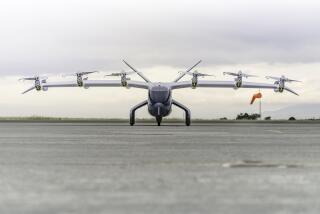Proposed airline merger could prevent fare increases
A federal lawsuit to stop the proposed merger of American Airlines and US Airways could be good for penny-pinching fliers.
The legal challenge filed in August by the U.S. Department of Justice says that the deal to create the world’s largest carrier would cut competition and lead to higher fares.
Until the lawsuit is settled or won by either side, don’t expect the two airlines to raise fares and give federal authorities more reason to fight the merger, said Rick Seaney, chief executive of the fare monitoring site Farecompare.com.
“It’s highly unlikely that they will initiate or go along with any fare hike,” he said.
Other airlines can raise fares on their own, but hikes are usually revoked unless all of the major carriers match the increase, he noted. “They all basically have to come up as a group,” Seaney said.
And so far this year, fare increases have been few.
For the first nine months of 2013, there have only been two fare increases that have been matched by all the major carriers. At the same time last year, six fare increases, ranging from $4 to $20 per round trip, had been adopted by all the major carriers.
Domestic air fares have increased 1% so far this year, compared to the same time last year.
The Justice Department’s lawsuit is scheduled to be heard in a Washington courtroom starting Nov. 25.
Alaska Airlines ranks first in fuel efficiency
If reducing your carbon footprint is a priority, Alaska Airlines may be the carrier for you.
In its first efficiency study, the International Council on Clean Transportation ranked the Seattle-based carrier as the nation’s most fuel-efficient major airline, followed by low-cost Spirit Airlines and Hawaiian Airlines.
Alaska was 26% more fuel efficient than the least efficient airline, Allegiant Air, according to the study, which was released last week.
“Aviation is a critical part of the U.S. economy, but it consumes a lot of oil and it’s the fastest-growing contributor to climate change from the transportation sector globally,” said Drew Kodjak, executive director of the council.
About one-third of the efficiencies can be attributed to technology, such as the use of fuel-efficient engines and those upturned winglets installed on many newer jets, the study concluded. Other factors included seat density and the percentage of seats filled. Taxiing with one engine instead of two also saves fuel.
Another key factor in fuel efficiency, the study found, is the routes served by the carrier. Short-haul trips are less efficient because takeoff and landing require more fuel, the study found.
Alaska Airlines is green in other ways too. It operates the first-of-its-kind solar-powered boarding ramp and supplies passengers with biodegradable forks, knives, spoons and napkins made of corn starch.
Coming to LAX on Wednesday: A Hello Kitty jetliner
Twenty five years ago, a giant black and white killer whale decorated the fuselage of a Southwest Airlines 737-300 as part of a promotional deal with Sea World.
A decade later, All Nippon Airlines decorated the first of several planes with Pokemon characters. Southwest got heads to turn in 2009, when it put the image of a bikini-clad supermodel on the side of one of its jets.
On Wednesday, the latest attention-grabbing jet lands at Los Angeles International Airport: The Hello Kitty plane.
A Boeing 777-300ER flown by Taiwan-based EVA Air and painted to honor the hugely popular feline will start to make three regular flights from LAX to Taipei.
Passengers on the plane might suffer from a Hello Kitty overdose. The cat will be on the pillow covers, and the hand soap and tissues in the bathroom. The flight attendants will be wearing Hello Kitty uniforms.
And if you need more Hello Kitty in your life, you can buy Hello Kitty items onboard, such as necklaces, pins, bags and aprons.
More to Read
Inside the business of entertainment
The Wide Shot brings you news, analysis and insights on everything from streaming wars to production — and what it all means for the future.
You may occasionally receive promotional content from the Los Angeles Times.










